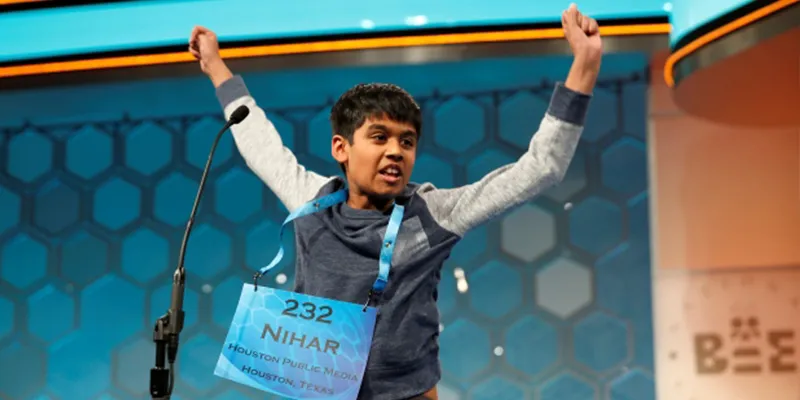How Indian Americans are winning the National Spelling Bee Competition year-after-year
On Thursday night at the Gaylord National Resort & Convention Center in Washington D.C, 13-year-old Jairam Hathwar and 11-year-old Nihar Janga were declared co-winners of the Scripps National Spelling Bee. This made it the ninth time in a row that an Indian-American had emerged victorious, adding more fuel to the general speculation around this peculiar phenomenon. How are the Indian-American kids who are part of a population that makes up roughly one percent of the US population emerging victorious year-after-year? Is it in their blood? Or the racial stereotype of a spelling gene perhaps? Or is there a more systematic explanation to the phenomenon? And if yes, what could be the factors that are contributing to the success of Indian American students at the event?

1) Educational qualification and natural tendency
According to PEW Research Center’s analysis of 2010 American Community Survey, 70 percent of Indian Americans aged 25 and older had college degrees in 2010, by far the highest rate among the six Asian-American groups studied and 2.5 times the rate among the overall US population. Thus, proving Indian Americans are among the most highly educated racial or ethnic groups in the US. This natural Asian tendency of leaning more towards academics as compared to the average American children who are more likely to take to sport may be a contributing factor.
2) The innate urge to stand out
“What might be happening [with Indian American contestants] is that there might be perseverance for the National Spelling Bee goal over a longer period of time. All bee wannabes devote thousands of hours studying tens of thousands of words. The difference for Indian American kids, may be a commitment to pursue the spelling championship over many years.” Paige Kimble, the bee’s longtime director told the Washington Post.
The reason for this perseverance may be due to a general superiority complex that exists in most successful minority ethnic groups. Another contributing factor may be a stark opposite of the former – insecurity.
3) The minor leagues
Another extremely popular factor may well be the actual reason.
It is the effect of “minor league” spelling bees that are created for and run by the Americans of South Asian descent. The two most prominent are the North South Foundation Spelling Bee and the South Asian Spelling Bee. These competitions have become breeding grounds for a generation of Indian American children who have set their sights on the Scripps National Spelling Bee title.
“Inside Shawnee’s Hindu temple and cultural center, 23 awkward kids took turns passing a microphone back and forth in a hushed beige auditorium. No spotlights, no podium, just cringe-inducing feedback on the PA system. And for the record, the spelling was a-t-r-o-c-i-o-u-s. Just three of the first 10 contestants spelled their words correctly. At one point, a poor kid paced in circles and clutched his crotch before misspelling beleaguered and sprinting off to the restroom,” writes Ben Paynter’s in his story which explains Indian-Americans’ prowess in spelling competitions .
Winning the Scripps National Spelling Bee, a competition that requires them to compete with 10 million students for over $40,000 in prizes, may be the ultimate target for Indian-American kids. Participating in minor leagues, which contribute greatly in honing their skills along with a chance to win $10,000 in prize money by competing with just a few thousand, makes a lot more sense for many. Apart from preparing students for the final competition, these leagues are also building friendships and mutual support and building an Indian-American Speller Community of sorts.
This noteworthy journey was also traced in “Spellbound”, a documentary released in 2002 that followed eight spellers on their path to the 1999 national bee and culminated with Nupur Lala’s exultant victory.
As more and more minor spelling leagues sprout up in different states and communities, there is also a negative sentiment around the winning streak of Indian-Americans on social media with comments like,
“The kids in the spelling bee should only be AMERICAN”
“No American sounding names who won the spelling B. #sad#fail”
“We need an American to win this spelling bee #tiredofindians”
This is a sensitive issue that the Scripps National Spelling Bee, an organisation that sees itself as representative of the American ideal of cultural diversity, had refused to acknowledge until recently.
“We are aware of Twitter posts that are not nice, which indicate that we have a long way to go as a country in embracing all of our immigrant population.” – Paige Kimble told The Washington Post.
Regardless of all the speculation and hate, it is indeed a matter of great pride for the Indian-American community to be creating a legacy of sorts in a faraway land. And the truth is that the real competition for the kids is against the dictionary, not anyone else. You either know the word you are asked to spell or you don’t.







